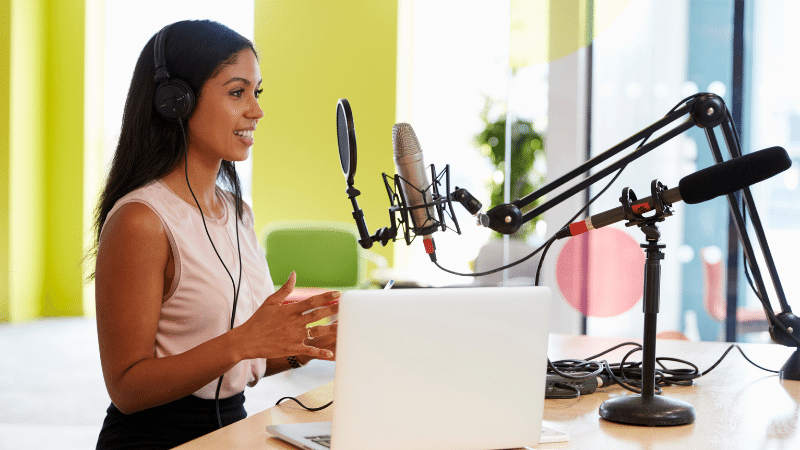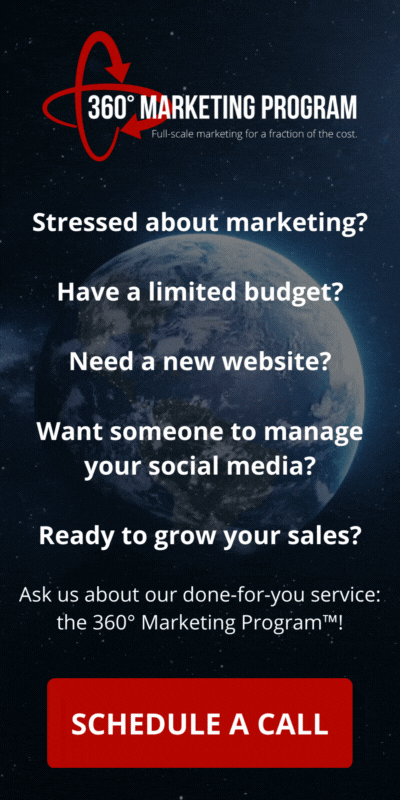Starting your own podcast may seem like a novel idea to help grow your business, but if you don’t know anything about it where do you start?
Below are actionable steps you can take to start your own podcast and upload your episodes to any platform you want to help you make quality podcasts.
Equipment Is King
With podcasting, you have to keep the end user in mind:
The listener.
Put yourself in a listener’s shoes: would you want to listen to a podcast that’s poorly produced, hard to understand, and contains tacky music and distracting background noises?
Um, absolutely not!
Save money. Grow online.
Learn what our 360° Marketing Program can do for your company to help you grow your business online!
Your equipment is the key to recording a successful episode each and every time.
Obviously, you’re going to have to prepare a quiet room – that’s hopefully the easy part. The more challenging question is, what equipment do you need to record quality audio?
There are myriad blog articles and videos on the subject, so we won’t delve into specifics here. You need to do the research and see what successful podcasters are using (hint: try YouTube first).
Needed podcasting equipment will include a microphone, a mic stand, a pop filter, an audio editing software, and/or an audio interface (AI) that accepts XLR inputs. More research on your end will lead you to the microphone you see fit.
Identify Your Niche
What is your podcast going to be about?
If you simply have the inspiration to start a podcast because it’s a novel idea to you, but have absolutely no clue what it would be about, then you need to reevaluate your overall business niche.
Seriously? Yes, seriously.
For instance, if you’re an Instagram influencer and have the body of a goddess, then that’s just fine.
But is that all the value you have to offer others? Some eye candy?
Probably not!
So for the ladies, let’s say you specialize in beauty products. Either you sell it online, make it yourself, or are an affiliate for a company. You use Instagram as your main platform but you want to start a podcast.
How do you do this?
Well, since your subject matter is beauty products, that’s a broad topic to choose from. Your niche might be teaching teenage girls struggling with their physical appearance and identity how to deal with their issues, and take your advice as gospel.
So, in turn, your podcast should be targeted only towards this audience and noone else, for the sake of continuity.
Where To Host Your Podcast
Many people new to podcasting have no idea what it means to “host” a podcast, so let’s break it down.
You have your podcast audio file recorded and ready to go…
…but now what?
Well, that file has to live online somewhere. It can’t just sit on your computer’s hard drive, and it has to be uploaded to iTunes, Spotify, etc. to reach your audience.
This means that you’re going to need a podcast hosting solution.
You can do this in one of two ways:
A.) Upload your podcast to a company like Castos.com where your podcast can live on its own to frolic with all of its other audio file friends.
B.) Build a website that not only houses your podcast files, but allows you to create other content that compliment your podcast (e.g., videos, downloads, membership subscriptions, etc.).
Whatever method you choose, it doesn’t matter – your podcast will make its way to reaching a global audience!
Research & Scripting
Podcasting isn’t usually as simple as just turning on the mic and pressing “record” in Audacity or Pro Tools.
It’s a show just like any other – Saturday Night Live, CBS News, Ghost Adventurers, you name it – and whether or not it’s done by yourself (solo), with a co-host, or held interview-style, you need to have a structure to your show.
Generally, podcasts are held in three segments for each episode. This includes the introduction, which may or may not have music; the content within the episode; finally, the outro that points your listeners to the next episode, your website, and/or to invite them to “tune in next time”.
Depending on what your podcast is about, you’re going to probably want to at least have an outline created for each episode.
You can create a script that you read from, much like how a news anchor reads from a teleprompter in the briefing room, or you can wing it and create a relaxed, less formal atmosphere.
It goes without saying, too, that if you’re dealing with factual information in your podcast that you’re going to want to do your research from reputable information sources, lest you become a laughing stock in the podcasting industry.
Develop A Recording Schedule
“If nothing changes, nothing changes.” -Anonymous
Here’s the thing, folks: if you don’t actually record your episodes on a regular basis, you don’t have a podcast.
Remember that a podcast is a show, and should be treated as such.
This is where most people who attempt to start a podcast go wrong; they don’t take it as seriously as if they were the host of The Tonight Show, and push themselves get in front of the microphone on a daily or at least weekly basis.
Developing a recording schedule will help you go create consistency in your publishing efforts. You can always record a bunch of shows in one day and then schedule them to be automatically published in the future; most hosting solutions offer this feature, but some of them charge more for this so be careful.
Editing & Audio Quality
If you have any experience with editing audio, then you’re already ahead of the game. Most people don’t even know what a waveform is, let alone what 44.1kHz means at 16 bits with +3dB of gain added.
The quality of your podcast audio and format will largely determine how successful it is. You could be the best marketer on planet Earth, but if your podcast sounds like it was recorded on a wax cylinder from 1905, then noone is going to want to listen to it.
So, with that being said, you can always hire a company to do it for you on a regular basis, and a good company will help keep you on track as well.
The other option is to take the time and actually learn how to do it yourself; this information is freely available from other entrepreneurs on YouTube (let’s face it, you could probably earn a Doctorate from watching YouTube videos these days).
Either way, there’s no excuse – make it happen!
Monetizing Your Podcast
Ah, now we get into the part you’re interested in!
Moneyyy.
So why in the world would podcasters spend thousands of hours researching, scripting, scheduling, recording, editing, publishing, and marketing their podcasts if technically it’s absolutely free to upload podcasts?
Simply put, they can attract an audience that brands want to leverage.
For instance, many business podcasts are affiliates for Blinkist, which condenses books into a short format that saves the readers time (think CliffNotes).
You can sign up for these companies’ affiliate programs, which will generate a special link, and then advertise that link in the show notes for users to get a discount (e.g., “Today’s show is brought to you by Acme, Inc…they offer [whatever they offer]…type in Acme Inc dot com, forward slash “cassus” for ten percent off your next order!”).
Or, you can network with actual companies if you have an impressive listener base, and perhaps get consistent advertising royalties…but that’s another subject altogether.
Podcasting Takes Dedication
In short, podcasting will be fun and exciting at first, but eventually like all other activities done on a regular basis, it’s going to feel like work.
So, you must, must be dedicated to the success of your podcast, or not even bother with it. It has to be integrated into your workday as a chunk of time for marketing activity.
But, once you have your podcast running and hundreds of episodes? Well, your life might just change.


